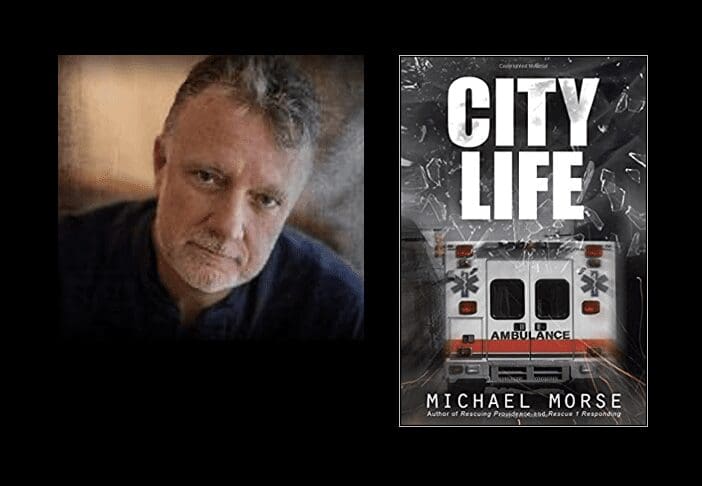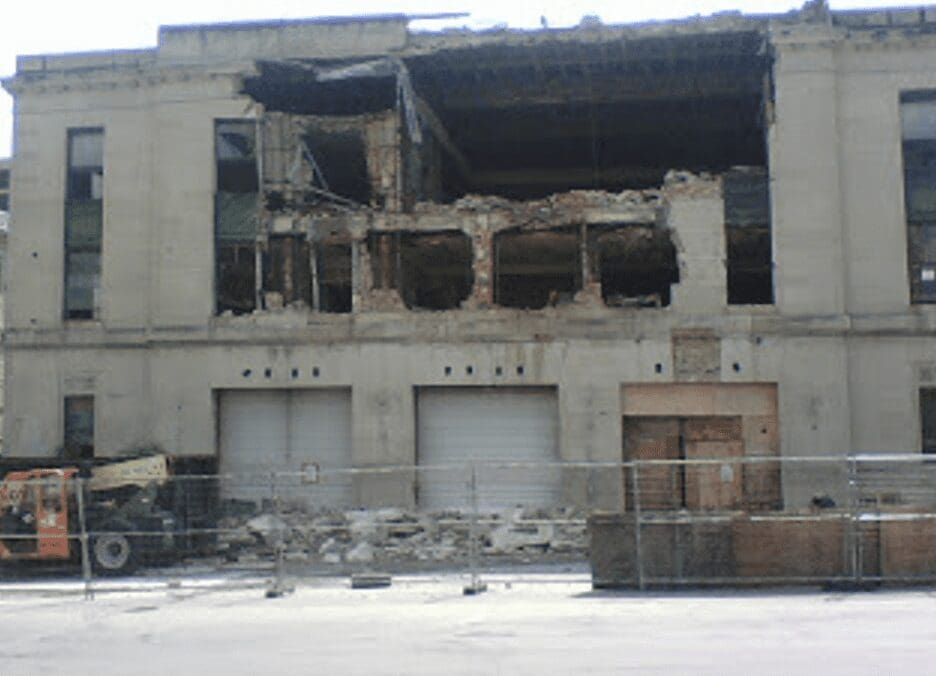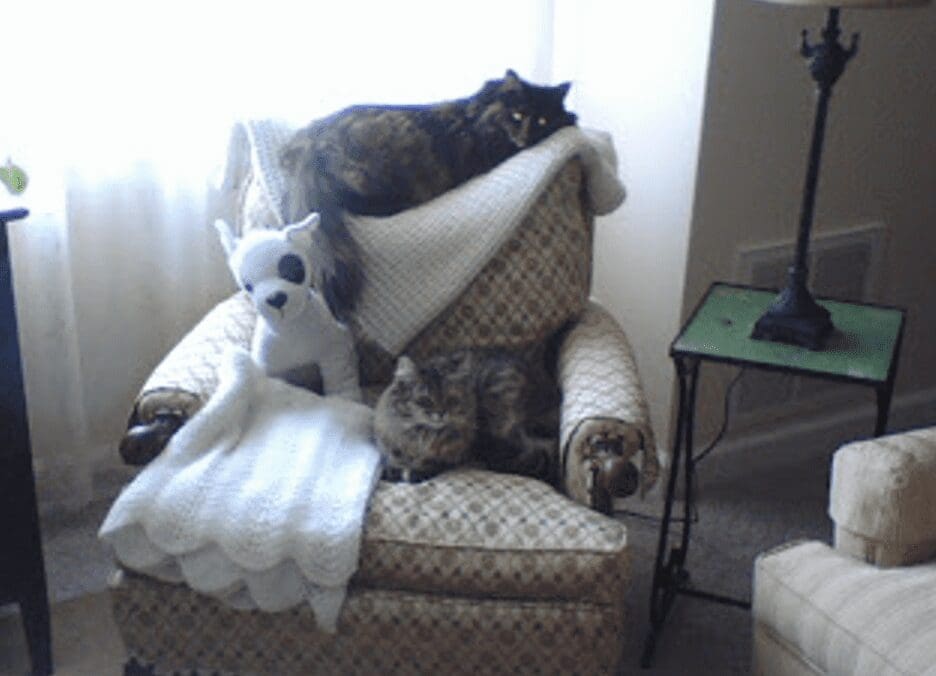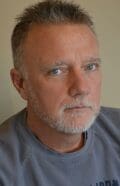Search Posts
Recent Posts
- Detailing Manhattan: Christopher Gray’s Legacy – David Brussat April 26, 2024
- Business Beat: BankNewport supports Kids’ Zone at new Save The Bay Hamilton Family Aquarium April 26, 2024
- Rhode Island Weather for April 26, 2024 – John Donnelly April 26, 2024
- GriefSPEAK: Dread. Fear. Welcome relief. – Mari Nardolillo Dias April 26, 2024
- Outdoors in RI: big animals, tiny Ticks, huge Trout, Chepachet’s Harmony Railway, 2A – Jeff Gross April 26, 2024
Categories
Subscribe!
Thanks for subscribing! Please check your email for further instructions.

Read With Us: CITY LIFE – a book by Michael Morse – Chapter 12
by Michael Morse, contributing writer
Chapter 12
August – Mercy
The fifteen floors of the Hartford Avenue housing projects loomed behind us as we walked through the oppressive late-night air toward our patient’s apartment. She lived in a one-level unit, identical to others scattered about the area, some urban planners’ good intentions gone bad. Broken glass and stale piss stuck to the bottoms of my shoes. I scraped them on the dew-covered crabgrass before walking through the doorway.
Screams came from somewhere inside, the words barely understandable but the anguish crystal clear. In the rear bedroom, lying on top of a filthy bare mattress in just her bra and panties, covered with sweat, we found the source of the screams.
“It hurts so bad!” she screamed over and over while clutching her belly. Fresh blood from under her panties joined whatever else lived on the mattress. “Get this baby out of me!” she cried.
We found out she was twenty-five weeks pregnant but hadn’t felt the baby move in two days. Chris helped get her dressed, then moved her to the stair chair. We rolled her out of her place into the humid night air, screaming all the way. The ride to Women and Infants Hospital was no different; the only information I was able to get from her was that she had been shot in the back in 2004 and needed a colostomy bag. Her skin showed the scars of her ordeal between her tattoos.
At the hospital an ultrasound showed no movement. I left before finding out anything more, not proud of my thoughts at that moment. Henry and I didn’t say much as we drove toward quarters. The night hadn’t lifted the oppressive air from the city. Sunrise was upon us, things were already heating up.
Nobody Sleeps Tonight!

The hole in the middle of the LaSalle Square fire headquarters is where I spent my first night as a Providence firefighter. There, in the dorm, D-Boy told stories of fires and acts of heroism from his early years on the job, back in the sixties during the race riots when Providence burned. The reputation we now enjoy as one of the best departments in the country was forged during that era, back when three or four occupied house fires a night was common.
I lay in the bunk, ready wrapped, and listened as two guys from Special Hazards and Ladder 1, Jon Broom and Mike Keefe—who years later would fall some seventy feet from a broken tower ladder, ending the careers they loved—joined in the storytelling. Ranger Rick, Keith Edson, and Tony Toro from Engine 3 joined the banter, torturing each other, joking and filling the dorm with hysterical laughter. Keith (Gus) Grant and Sean Reddy, the other guys from Ladder 1, joined Bob Reilly from the Hazards, adding fuel to the fire until we made so much racket Captain Dillon stormed into the dorm, flipped on the lights, and announced, “NOBODY SLEEPS TONIGHT!”
Things were quiet for a while, then the bell tipped and I got my first taste of the red devil! While I dozed, Jon and Mike crumbled newspaper, put it on my bed, and set me on fire. Tony put me out with a bucket of water. The dorm went berserk again. Captain Dillon stayed away this time, probably afraid of what he would find. Lieutenant Cochrain from Engine 3 never left his room, but I can imagine him chuckling downstairs, knowing what the guys were putting me through.
Things quieted down again, but I stayed awake all night, soaked, smoky, and content. I’ve had a great career and expect more great years, but nothing will ever be as good as it was that night. I remember it like it was yesterday.
They can tear down the building, but the spirit of the firefighters who lived, who really lived, in that building will live forever.
The Wanderer
Things must have been dull at home so he went for a walk. Broad Street is a happening place. There’s a bakery, a record store, people walking all over. Traffic moves fast but if you are quick you can get around without getting run over. Grandma took her pain pill and was asleep on the couch; TV was boring so off he went. Too bad the cops were on the ball; they ruined his stroll and took him home, six blocks away. What’s a two-and-a-half-year-old supposed to do all day, watch his grandmother sleep?
Six Inches
Three years ago a young guy was killed while doing stunts with his motorcycle on Berkshire Street. He hit a fire hydrant while doing a wheelie. Every year his surviving friends and family gather around the hydrant to remember their loved one; a solemn, dignified moment in an inner city housing project.
Last night’s memorial was interrupted when a van drove by the mourners, spraying them with gunfire, hitting two people and injuring more as they dove for cover. The brother of the motorcycle victim ended up in my rescue, his elbow shattered by a small-caliber bullet. Six inches to the left it would have been his heart. I took the kid’s friend with us as we sped toward Rhode Island Hospital. They talked about how lucky they were to survive the ordeal, how chance plays such a huge role in determining who lives and who dies. A jump to the left instead of ducking when he saw the van approaching would have left him dead, his body full of holes instead of the building he stood in front of.
The emergency room was bustling with police activity when we arrived. There was a report of the shooters going to different hospitals to finish the job. Rhode Island Hospital was under intense police protection. Things seemed safe enough; I opened the rear doors of the rescue and brought my patients in.
Deported (departed)
“He’s a diabetic,” said one of the officers.
“I don’t think that’s the problem,” I replied.
He was about to be deported. As soon as he arrived at the INS office his condition deteriorated, and within minutes he was seizing on the cement floor of the holding cell.
The guys from Engine 9 had an IV started and were working on vital signs.
“Let’s get him in the truck.”
As soon as I said it the guys lifted him from the floor and put him on the stretcher. We wheeled him out of the holding cell and past office staff and federal agents into the back of the reserve rescue we had for the day while Rescue 1 was out for repairs. Hot air blew from the air conditioning vents. I shut the AC off and we got to work in the hundred-degree heat.
“I need vitals and an EKG.”
“I don’t feel a pulse,” said Mark
A flat line showed on the EKG screen. Shotzy checked the leads, Mark and Steve started CPR, Cappy got a vial of epinephrine ready. The patient remained pulseless, we pushed the epi, checked the screen, felt for a pulse; nothing.
We gave another round of epi, some atropine, continued CPR, tried and failed to intubate, and transported him to Rhode Island Hospital. I called the ER en route to give them time to get the trauma room ready. The team was assembled. The guys moved the patient from our stretcher to theirs, wires, tubes, IV bags, oxygen all sorted out in seconds. The room grew quiet, waiting to hear the story.
“Thirty-five-year-old in cardiac arrest, witnessed, diabetic history with a glucose of 134, seizure-like activity noted at 1605, asystolic upon EMS arrival at 1610, two rounds of epi, one atropine, two milligrams of Narcan, patient remains asystolic, CPR immediate upon arrest.”
The trauma team got to work, started another IV, took over CPR, worked the code for fifteen minutes but never got a pulse.
Homecoming
Finally, Maria and Jeff brought John home. His crib at the ICU unit at Women and Infants Hospital was cozy enough. Pictures of the house, tractor, the dogs, and of course dad’s fire truck made it bearable, but all the coming and going, wires, monitors, and racket made him eager to see home.
From all of us at Rescuing Providence (uh… me), welcome home!
Through the Haze

It never fails to amaze me when I travel this path how three miles separates the tranquil way of life I have grown accustomed to from the madness lurking on the horizon. The skyline of Providence can be seen in this picture, right in the middle, over the swans. My other life waits there, three days away. For now, I’ll relax on the beach, watch the dogs bite the waves, and clear my head of last week’s events.
News stories about one of my patients keep cropping up, his story and subsequent twisting of his sad demise a sorry indication of just how far off track our society has become. His body wasn’t even cold before accusations of wrongdoing by the people sworn to uphold the laws of this great land were broadcast over the airwaves and in our newspapers. It’s a wonder any of them bother to show up for work, knowing how eager the media is to hang them.
On another street, twenty hours later I tried and failed to revive a thirty-eight-year-old guy whose heart stopped after his pickup truck ran out of gas and he tried to push it up a hill. Nobody to blame for that one; no story to titillate the masses, no hot button issue to sell advertising, just another dead guy, younger than me, on the stretcher in back of my rescue.
A couple of kids got shot, a girl got beat up with a bat, another one hit by a car. Lonely old people needed someone to talk to, we were the only ones who listened. Drunks said they needed rehab, but only until their check came in and they could start all over.
I’ll be starting over in a couple of days. From the beach I can see Providence through the haze, knowing that though I’m not there, it never really leaves me.
All for Nothing
The back of his head was smashed and there was a bump on his forehead. He had been drinking at the club, a place once full of wiseguys, now full of hot air. They showed him the door after getting him drunk, none too gently I’m sure.
“Why did they throw you out?” I asked.
“I’m not just an idiot . . . I work at it,” he replied.
“What happened to your head?” I asked.
“Fell.”
“Nobody hit you?”
“Fell.”
He grew up on Federal Hill, in the heart of “Little Italy.” In the sixties he would have been in his twenties, just the right age to be involved, or connected as we like to say around here. Raymond Patriarca was the man then, doing business from his office near where we found our patient. “Coin Vending” was all the sign outside said. I guess they couldn’t fit extortion, prostitution, gambling, number running, drug dealing, and murder on it.
“I’m taking you to the hospital.”
“I just want to go home.”
“You’re drunk and have a head injury. You’re going to the hospital.”
“Please, let me go home. I don’t have insurance.”
“They’ll take care of you, don’t worry.”
He complained a little more but was in no position to argue. His blood pressure was 90/48, something seriously wrong besides the obvious. He talked a little about the old days, back when guys like him ran the city. Not having insurance would have been the least of his worries then. He wouldn’t have been thrown out of the “club” either. They used to take care of their own. His arms showed prison tattoos, proof of time spent behind bars, probably for nothing more than keeping his mouth shut. Men didn’t sing in those days. There was a twisted sense of honor among thieves.
As we approached the hospital he talked a little about the family. The fact that he was alone now, sick, old, and alone, didn’t escape us. I asked if it was worth it.
“It was all for nothing,” he said, dejected, and closed his eyes.
Rescue at Sea
The seven survivors were in the back of Rescue 1, shivering, laughing, and talking a mile a minute in Spanish. They had just survived a harrowing ordeal; their small boat had lost power in the Providence River and had run aground on the rocky, debris-filled shore of Fields Point. The guys from Engine 13 along with members of the Coast Guard secured a line to the boat and freed it from the abandoned pier where it was stuck. The guys looked like they had been fishing when trouble started.
We watched from the shore as their boat was towed toward safety with one of their party on board to man the wheel. Engine 13’s taillights faded from view on land, the boat disappeared into the evening mist.
“What are we going to do with them?” one of the firefighters asked.
“Take them with me,” I said.
“They won’t fit.”
“They fit in the boat.”
One of them spoke English and told us where they parked their cars before launching. It was just across the river in East Providence.
“Pile in,” I said while holding the rear doors of the rescue open. They fit.
When they tell their tale of misadventure to friends and family, I hope they mention the Providence Fire Department and US Coast Guard in a positive light. I know I enjoyed helping them.
Water Fire

The light wind lifts the smoke from the river’s surface and with it I feel my spirit rise. We leaned on the railing by the water’s edge, my wife, Cheryl, by my side, soothing music hypnotizing the thousands in attendance as the gondolier rowed past. This is the heart of the city, not the streets where I spend most of my days. Here, a sense of peace and tranquility allows me to forget my troubles and focus on living. Not the living I have grown accustomed to, the lists, problems, and daily grind. This is the balance to that, when time stands still. I can focus on breathing, listening, and the sights around me.
Cold War
“What’s your name?”
“Fuck you!”
“Is that your first or last name?”
“My name none of your business!”
“I thought it was fuck you.”
“It’s Mikhail Gorbachev!”
“Gorbachev is dead.”
“So am I.”
And so it went. We were called to one of the many high-rises in the city to take an intoxicated man to the hospital. Three police cruisers and one of our chief’s cars were in front of the building when we arrived. An elderly Russian immigrant, up to his teeth in Stoli, sat on a bench outside cursing and pointing at the grim-faced officers. Chief Desmaris walked out of the lobby.
“This guy has been screwing with the elevators for an hour,” he said. “He’s got the place in an uproar.”
It was three in the morning.
“Let’s go,” I said to the drunken man.
“Fuck you! I want lawyer!”
“I’m Johnny Cochran. Let’s go.”
“Johnny Cochran dead!” he said, but followed me to the truck anyway.
The ghosts of Gorbachev and Johnny Cochran rode to the hospital in the back of Rescue 1. It was a short ride. Gorbachev had settled down by the time we got there. We actually shared some laughs en route. I tried to tell him that the folks at the hospital won’t tolerate any drunken behavior, but he didn’t listen.
The party was over when I walked him into the ER and gave my report.
“Uncooperative, unknown male, intoxicated,” I said to Marie and Alieda at triage. They had seen enough. As I walked back to the rescue, three security guards were descending on Gorbachev, restraints ready.
Take Your Runs!
We try, we really do, to keep up with the calls that keep coming. One after the other people call, sometimes all at once. Six rescues for a city the size of Providence is simply not enough.
There are times when you just can’t take another one. Fatigue, frustration, and hunger all contribute to turning a deaf ear to the radio. Somehow, the obvious “true” emergencies get through, the stubbed toes, toothaches, etc., all turn into static when you have had enough.
Wednesday night, midnight. Rescue 1 was called to Charles Street for a man who “couldn’t sleep.” Charles Street is in the heart of Rescue 3’s area. I listened to the radio for a minute, silently praying I would hear the lieutenant from Rescue 3 come in service and take his run. No such luck. Most of the shift was working overtime, everybody was shot. One more, I thought, and out the door we went.
Interstate 95 was closed due to the construction project, so we had to go through the city. There wasn’t much traffic at this hour, only one vehicle ahead of us. Could it be? You bet. Rescue 3. We passed them, lights and sirens blaring, except for when we turned off the siren to say “Take your runs!” over the PA system. Had I not been guilty of similar infractions in the past I might have been mad; instead, I found the whole situation hilarious. They would have pulled it off had the on ramp been open. There is an art to deception, but it takes years of practice.
Rescue 3’s officer, name deleted at the officer’s request, got on the radio a minute later and offered to take the call.
“Negative, fire alarm, we’re a few feet ahead of him, we’ll continue,” I said over the air. I could hear the dispatcher’s chuckle in the background. They all know the intricate chess game we play on the streets while trying to maintain our sanity.
A few minutes after we arrived at Charles Street, Rescue 3 got a call for an intoxicated man in Olneyville. Rescue 6 didn’t surface; the 3s took the call.
Another night in Providence.
Used to Be My Chair

Rescue 1 rolled into the rescue bay at Rhode Island Hospital at around ten o’clock. Zack and Teresa opened the side and rear doors simultaneously as we sometimes do to say hello and see if we can help. My patient was an eighteen-year-old kid who looked healthy enough, unless you had just heard her story. I said hello to Zack and Teresa and walked through the doors with Monica.
“What’s wrong?” Teresa asked.
“Nothing, just tired.”
I wasn’t tired and Teresa knew it. She stayed outside with Zack and the other guys, catching up on the latest gossip and getting ready for more runs. It’s a ritual we all look forward to. One by one the rescues leave, either going on calls or just heading back to the station.
I gave my report to the triage nurses, glad that it was Katy working, somebody I knew would take good care of the patient.
“She’s eighteen, complaining of pain to her lower abdomen, bruises to the right side of her face, lumps on the back of her head and neck. She was forcibly raped in Boston, didn’t know what to do, got on a bus and came here. We’re the first people she’s talked to, the police are on their way.”
Katy walked over to Monica, crouched down so she was at eye level, and started to talk to her. My job was done, so I went back outside. Zack and Teresa were still there.
I told them about the girl. They understood my somber mood and didn’t push for any more. I got back in the truck and headed back to the station.
I saw them a few hours later, same place, only I was back to normal.
Twenty-One Days and a Wake-Up
Their replacements are straggling in, twenty today, some more tomorrow. Soon the entire 1207th will be replaced by the “new guys.” Twenty-one days left. Stay safe, folks!
It’s been well over a year since they reported for training last July. A lot has happened during that time. Here, at home we continued to build our careers, watched our children grow, planted gardens and enjoyed the fruits of our labor, enjoyed the pleasure of our spouse’s company, and gotten on with our lives.
There, they have eaten sand and sweat, followed orders, gave orders, seen friends get hurt and die, and watched as the world moved on without them. There are no tomato gardens in the desert. There are bullets and bombs and people who want to kill us. Thank you, Bob, and everybody from the 1207th and everybody else over there for standing in their way. Your sacrifices are almost done, but what you have accomplished will never be forgotten, not by me or anybody else who calls themselves an American.
Ultimate Sacrifices
Two Boston firefighters paid the ultimate sacrifice last night. Two New York firefighters last week. Rest in peace, brothers, we’ll see you in Heaven. Condolences to their families.
Life Moves Fast
Stubborn old coot got his leg stuck under the front seat of the van he was trying to get into. Instead of sending a sedan like they usually do, the cab company sent the minivan. Dan should have waited, at least that’s what his wife of fifty-eight years said as she stood under a shade tree a few feet away and watched us work. They had moved into the place only a week and a half ago, she said. They had to give up their home in Cranston, just couldn’t keep it up. They were worried about their failing health as well. It looked as though they found a nice place to enjoy some quiet years.
Dan had maneuvered himself so he was kneeling on one knee but the other leg just got “more stuck.” The more he moved, the “more stuck” it got. He was howling in pain when we arrived. The assisted living staff, the cabbie, Dan’s wife, some neighborhood kids—all were helpless, waiting for somebody who knew what to do.
Call 911! I thought as I looked at the hopelessly stuck leg.
You ARE 911!
Better think of something. I tried to move the seat forward, Dan’s howling intensified. Plan B. I had Veakro lift from one side while I lifted him from the other, trying to get him back to a forward position. No go. I thought I had ripped his leg off from the noise he made. From my vantage point there was no bleeding, no deformity, and no way we were going to get him out of there without making a huge production out of this, hydraulic equipment, Special Hazards, the whole nine yards.
“Veakro, on three,” I said. Veakro understood. He grabbed one arm and leg, I grabbed the other.
“One, two, THREE!”
We lifted, turned, and weaseled him out from under the seat in about three seconds. He stopped shouting once his leg was free. We helped him stand up, put pressure on the leg, and take a few steps. I wanted to take him to the ER for an evaluation; he said he had called for a cab to get to his doctor’s appointment. He was proud of his independence. He signed a refusal form and we said good-bye . . .
Midnight. A call came in to the same address for a man bleeding from the head in an assisted living facility, the same one where we helped Dan earlier in the day. Sure enough, we opened one of the apartment doors and there was Dan, a six-inch laceration to the top of his head, lying in a pool of blood on the bathroom floor, his wife standing next to him. He was nearly unconscious but looked at me all the way to the hospital. He suffered a stroke, then fell to the floor, smashing his head.
A week and a half. From homeowners, to assisted living, and now, in all likelihood, a nursing home. Life moves fast as you get older.
___
To read Chapters 1-11:
https://rinewstoday.com/michael-morse/

Michael Morse, [email protected], a monthly contributor is a retired Captain with the Providence Fire Department
Michael Morse spent 23 years as a firefighter/EMT with the Providence Fire Department before retiring in 2013 as Captain, Rescue Co. 5. He is an author of several books, most offering fellow firefighter/EMTs and the general population alike a poignant glimpse into one person’s journey through life, work and hope for the future. He is a Warwick resident.

